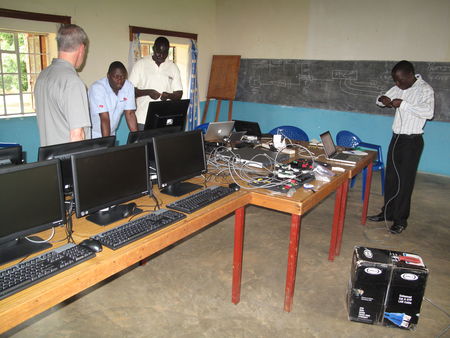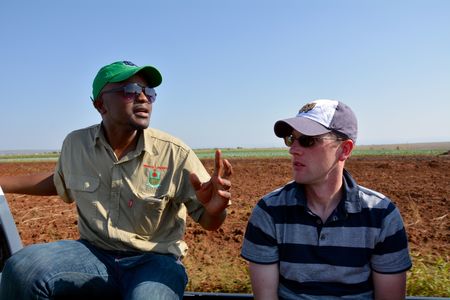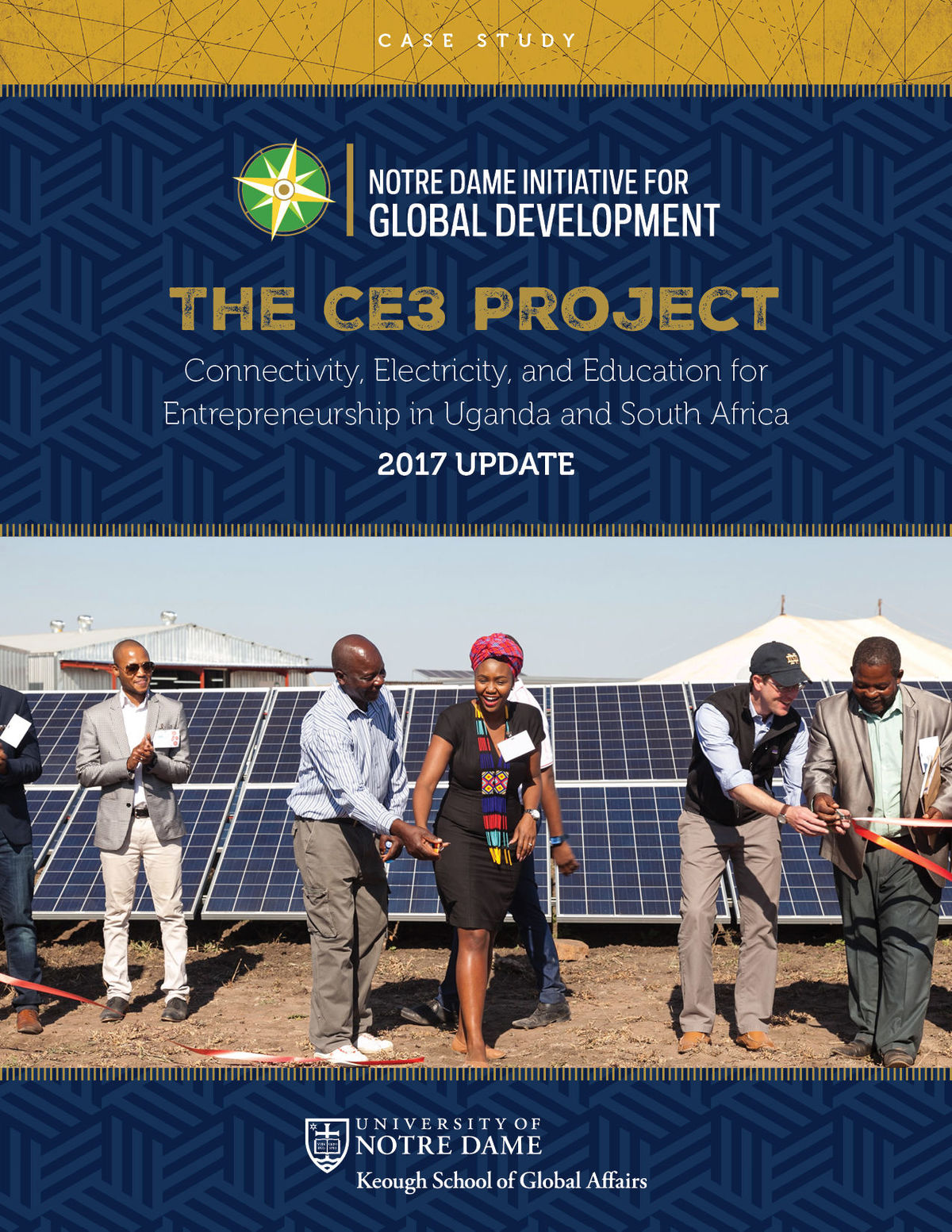CE3 Project
Connectivity, Electricity, and Education for Entrepreneurship
IMPACT
Prior to the Pulte Institute's implementation of the Connectivity, Electricity, and Education for Entrepreneurship (CE3) pilot in Uganda, project sites were disconnected from the electrical grid, had no access to the Internet, and possessed little computing infrastructure. With clean, renewable solar energy provided by CE3, more than 3,000 students at two secondary schools are now able to study in the evening, fully equipped computer labs are now used for entrepreneurship and job skills training, and 200 new jobs have been created. Overall, CE3 demonstrated its potential to increase local, sustainable economic and human development through the pilot.
Based on this success, the Pulte Institute scaled to additional communities in Uganda and South Africa. By the close of the next phase, CE3 had skilled over 3,500 entrepreneurs, created over 2,500 new jobs, and reached nearly 10,000 individuals in Africa.
CE3 sought impact beyond these outputs as well. The Pulte Institute developed, tested, and refined a model of economic and human development that is economically sustainable. Innovating and iterating the CE3 model contributed to our understanding of how to design and deliver connectivity, energy, and education solutions that will continue to promote entrepreneurship and impact communities long after the initial project.
BACKGROUND
Working at the electrification frontier, the Pulte Institute leveraged sponsorship and consulting services from Accenture to design, implement, and monitor a new model of rural energy access. CE3 is a long-term, sustainable ecosystem that goes further than solar power, connectivity, education or any standalone solution. Instead, CE3 fosters an integrated systems approach that includes:
- Providing communities with clean, efficient, renewable energy on the kilowatt scale to power businesses and schools with costs that can be recaptured for sustainability and local reinvestment;
- Computer access, intranet and Internet connectivity and training to enable access to information and resources, unleashing the creativity and motivation of the local community; and
- Entrepreneurial training, coupled with local and remote mentorship, providing basic leadership and business knowledge that leads to greater economic activity.
Uganda

For the past two decades, northern Uganda has been the center of violence perpetrated by the Lord’s Resistance Army rebels, which resulted in 2 million people being displaced from their homes and tens of thousands killed. In recent years, there has been relative stability in northern Uganda, but the people and communities still have limited access to electricity, connectivity, and jobs, resulting in crippling isolation. Only about 15% of Ugandans have access to grid electricity, and it is only about 75% reliable for those who are connected.
Launched in 2006 by a group that included Notre Dame alumni and faculty, BOSCO-Uganda began leapfrogging the missing technical infrastructure to supply ICT connectivity and training, strengthening communities in war-affected rural villages. High-speed intranet connected users with one another across regional communities, and a modest shared Internet connection brought news of events elsewhere in Uganda and the world. Soon other international partners such as UNICEF joined the effort.
From the beginning, BOSCO’s communities began to leverage surplus solar power—beyond what was needed to power ICT—for small entrepreneurial ventures such as mobile phone charging and print services. Beginning in 2013, the Pulte Institute brought BOSCO together with members of the Accenture team. The group began to discuss how they might build on that small start, equipping BOSCO users with entrepreneurial skills and micro-scale solar energy in support of new business ventures. There were obvious synergies and CE3 was born to make the most of them.
South Africa

Racial inequalities persist across South Africa’s agricultural industries. Pre-apartheid legislation served as a legal way for the government to move farmers of color off of good, arable lands and locate them on undesirable farmland with poor soil, terrain, and topography. During the apartheid era, the South African government heavily subsidized the development and maintenance of irrigation and water infrastructure for land owned and inhabited by white commercial farmers. Today, during frequent and sustained drought periods, farmers of color struggle to compete in the local market against these established commercial farms as their irrigation equipment is outdated and energy inefficient. This makes traditional pumping methods using grid power or Diesel engines expensive and, ultimately, unsustainable. The provision of clean, renewable energy and business training such as market analysis is therefore paramount to the survival and development of the smallholder farming industry in South Africa.
Exacerbating the impact of water scarcity, South Africa has also become an energy scarce country with severe limits in power availability due to demand well in excess of supply for nearly a decade. As a result, the national utility has increased power costs at an average of 15% per year. For those farmers with access to irrigation, powering those irrigation schemes is more expensive by the day and places an enormous financial strain on farmers and co-operatives.
CE3 partners with these co-operatives to provide solar energy, ICT labs, and entrepreneurship training to members and the surrounding community. With affordable, reliable energy, access to real-time agricultural market information, and increased business acumen, smallholder farmers will be able to compete.
Partnership
In 2012, Accenture and the Accenture Foundations awarded the Pulte Institute two grants as part of the company’s Skills to Succeed corporate citizenship initiative, which aims to equip 3 million people with the skills to get a job or build a business by 2020. In addition, the company committed to giving a substantial amount of pro bono and volunteer time to assist with the efforts. This unique project also furthers Accenture’s efforts to support the environment.
Hewlett-Packard and Lenovo have strengthened the ICT infrastructure for this project with donations of over 100 computers, accompanying software, servers, and peripherals. These low-power systems provided a consistent user experience at the lowest possible energy cost, leaving more energy for entrepreneurial and other job-creating initiatives. SunEdison Philanthropy donated 60kW of solar panels for integration into CE3 micro grids to power the ICT labs and local businesses.
Completing this comprehensive approach, the Pulte Institute provided project management and evaluation experts to research the impact that these efforts have on local communities.
The Partnership operates with the understanding that to build local economies, communities need improved technological and entrepreneurial skills, and to make those skills profitable, communities need reliable, clean energy. This is the theory of change that undergirds the CE3 model.
Sustainability
In addition to the provision of renewable energy resources and tools for entrepreneurship, the Pulte Institute and Accenture continue to seek economic sustainability. Ultimately, CE3 seeks full economic sustainability where all capital and operating expenses are recovered through energy utility sales – something rarely achieved in international development. This full sustainability will allow for replication of CE3 and an associated increase in local economic and human development across multiple geographies. Furthermore, the CE3 business model will empower communities as system owners and partners in their own development.
Related News:
NDIGD completes baseline study for CE3 project in Uganda
HP joins Notre Dame Initiative for Global Development partnership in Uganda
